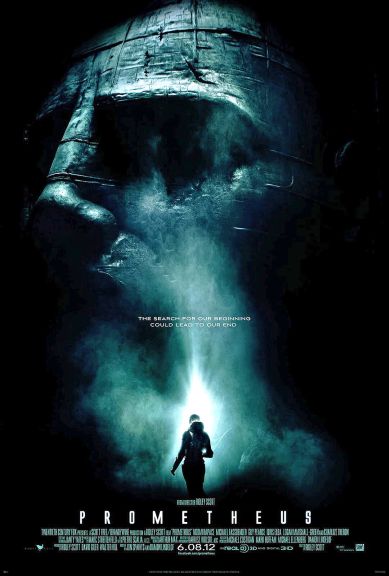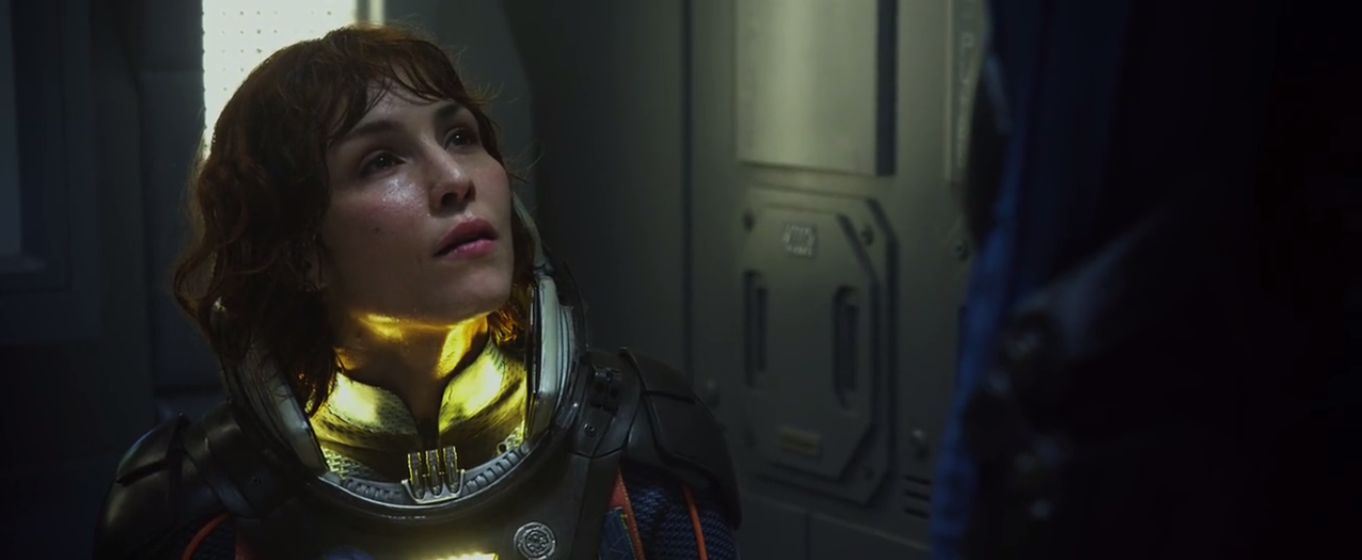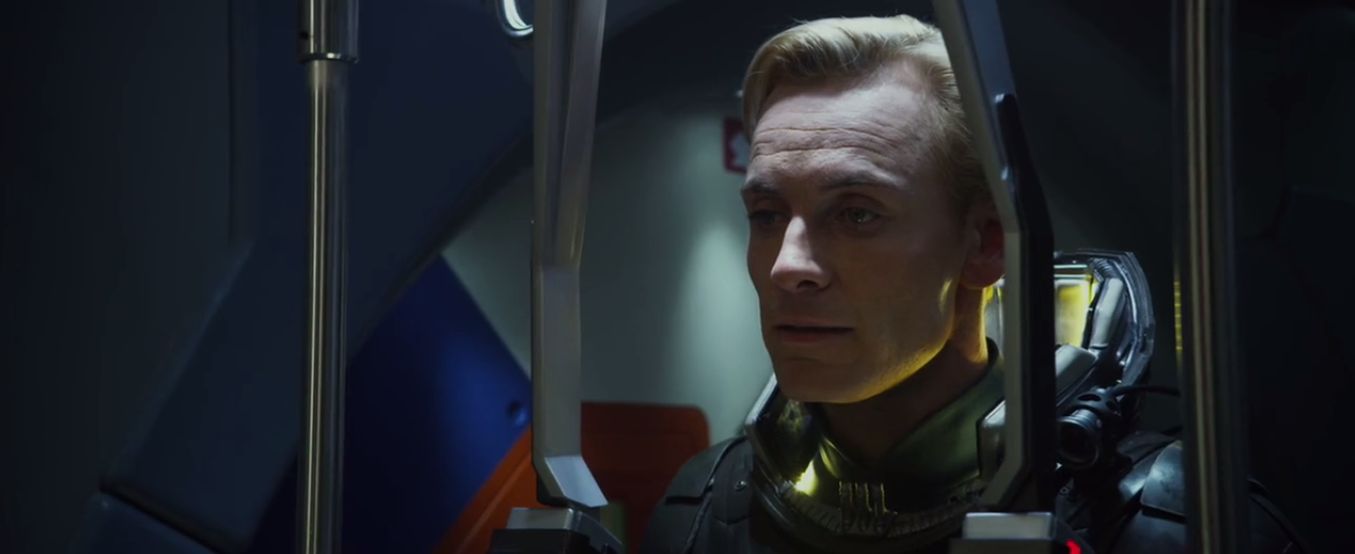Prometheus (2012)
/
Prometheus seems to be one of the most discussed movies of the last couple of years. You find an endless amount of posts about its general meaning, the ending, individual scenes or just lines. I find it fascinating that a movie can have such a strong reaction that is not simply love or hate but thought. People think about this movie to figure it out and even people who don’t like it mostly do because of unanswered questions that bother them. How often does a movie get that kind of feedback, especially one that cost more than $100 million? It is a rare example of a movie full of ideas (even if the execution is not perfect).
(minor spoilers ahead)
I liked the movie just for the experience it provided. It has great, epic shots that seem very hard to do since most Hollywood movies fails to generate this sense of awe that director Ridley Scott generates here. I also liked the horror parts because they were genuinely scary (and yes, I thought the birth scene was brilliant). I, like everyone else, loved Michael Fassbender (he’s becoming a real favourite of mine) and his role as David, and I especially smiled at his infatuation for Lawrence of Arabia. I liked the monsters because I like monsters. The opening scene was amazing and again the camera work in general was excellent. Arthur Max’s production design is exceptional. I even liked the music by Marc Streitenfeld (who surprised me in that I had never heard his name before, the score sounded a bit like James Horner before the credits told me) because it was atypical for a movie like this. I also liked the many references to the Alien movies that were so nice because there were so many small ones and not the obvious It’s Alien! (okay, apart from the last scene). I was disappointed by Noomi Rapace as she never seemed to be into her role very much even if you can see her trying, but it's just no Lisbeth. The screenplay was full of smart and interesting ideas but coherence was not its strongest suit. I like that we got a bit of everything but it was not satisfying as a whole.
Coming back to my opening paragraph, before I had watched the movie, I was sure I would write about it because my anticipation was that there would be some interesting ideas to discuss. It took me a whole day of trying to wrap my brain around this movie to come up with something because Prometheus is not an easy fish to catch. There is so much there but not much has enough real substance to dig into it. Then again, if you read about its makers’ many ideas behind the movie it’s even more astounding, not because the movie doesn’t show off their thoughts (faith vs. science, mythic creationism, human vs. android, life and death, etc.) but every other scene is about something else. It is not as ambiguously fascinating as 2001 (which it clearly wants to be with all its references), that obviously asks the viewer to find their own answers but also isn’t able to be as multi-layered in its meaning as Lola rennt (which I’ll write about soon). It was all over the map but in a good way.
Anyway, I didn’t want to watch the movie again to find something to write about but I also didn’t want to give up, so I just picked one line that jumped out at me and fits well into my one of my themes here and another theme that is always relevant to me.
Scientist Shaw (Noomi Rapace) and the android David (Michael Fassbender) talk about what happens when CEO Peter Weyland (Guy Pearce) dies. Shaw asks this question because Weyland has basically been David’s father and David has been doing everything for Weyland up to this point. Or so it seems, as there are moments when his motivations are less clear. Anyway, their dialogue then goes as follows:
David: I suppose I’d be free. Shaw: You want that? David: Want? Not a concept I’m familiar with. That being said, doesn’t everyone want their parents dead? Shaw (gets up quickly): I didn’t. David smiles
This is interesting on many levels. David implies both that parents keep you from being free and in a way that he has not been taught to want anything, which might end with his father’s death. David is an android and Weyland is his maker, so you would expect him to do what Weyland wants from him. But it still rings so familiar, this idea of parents who try to make you into something that has no own will. As I said many times before, this is a popular concept in our culture (see also 12 Years a Slave and Man of Steel) and David embodies it perfectly as he literally is a product of his father. This of course makes his “Everyone wants their parents dead” quip even more fascinating, both as a statement from this character but also as a general assertion about our culture. Shaw reacts so fast and seems almost frightened by his assumption, showing something many people would do in response. “What, no, I don’t many parents dead, how can you say that?” And if parent-children relationships actually worked most of the time, this reaction would be understandable. But for many people it is freedom to separate themselves from their parents, as I know personally and from many people’s experience. His smile at the end seems to confirm her insecurity to that line, as somewhere inside of her there might be a small child wanting to be free of her parents’ grasp.
David is an endlessly fascinating character and you could write more about him, but that particular exchange seems really special and works on many levels within and without the movie. It’s an interesting line of dialogue to ponder on.


Another aspect that came to my mind after thinking about for too long was so obvious I didn’t even see it (which can happen even if you set out to question as much as possible). The movie uses a very common trope, especially in sci-fi movies, that boils down to: Humans are flawed. Many interpretations of Prometheus (I think even from the makers themselves) indicate that the ship’s crew is punished for trying to find out who their makers are and imagining themselves to better too important. Also, the idea that the Engineers want to extinguish humankind because they turned out to be too dangerous and self-destructive emphasizes that concept. And again, it is a very common concept. Ask anyone if they think humans are flawed creatures and it’s very likely to hear a “Yes.” I will come back to that concept at a later point, but let me just state here that one of our biggest problems in our culture is that concept because it implies that there is nothing we can do about it. If humans are flawed, there is no hope because we can’t not be humans. But what if it isn’t humans who are flawed but just one single human culture, in that case, our culture? Now, there’s some hope. (once more, hats off to Daniel Quinn for opening my eyes with that idea). But again, this would go too far now, so let me end this by saying Prometheus does an excellent job in driving that concept home even more, which won’t help anyone but just shows its roots as an artifact of our culture. Which doesn’t make it worse, just, well, unhelpful.
It is connected to another main theme of this and many other fictions, the questions of “Where do we start? Why are we here?” Besides the fact that Lola rennt deals much better with these questions, it must be said that also, these are questions pretty unique to our culture and you only need to ask that question if you are insecure about your place in the world. Or if you think you are flawed.

